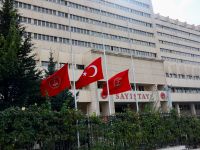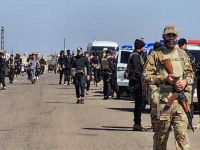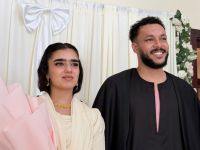New AUB President Fadlo R. Khuri tells students during Opening Ceremony: AUB will provide you with the environment to allow you to fly
The American University of Beirut will develop and nurture “a culture that allows for the pursuit of excellence without the constraints of fear of failure - a culture of high risk, high reward scholarship and education, where well-intentioned mistakes are [considered] informative and treated with guidance, understanding and affirmation,” said AUB President Fadlo R. Khuri, during the annual Opening Ceremony that marks the beginning of the new academic year, before a packed Assembly Hall onSeptember 7, 2015.
Dr. Khuri, AUB’s first Lebanese president, was appointed as the University’s 16th president in March, and he assumed office on September 1, 2015. Before joining AUB, he was most recently Professor and Chairman of the Department of Hematology and Medical Oncology at Emory University’s School of Medicine, and the Roberto C. Goizueta Distinguished Chair for Cancer Research. He also served as Deputy Director for the Winship Cancer Institute of Emory University. Dr. Khuri was also the Executive Associate Dean for Research of the Emory University School of Medicine.
Almost 2040 new students have registered to join AUB this year, 21 percent of whom are international students. Additionally AUB also welcomed 40 new faculty members for fall 2015-16.
Entitled "Learning to Fly Without a Safety Net," Dr. Khuri’s address (full speech attached) highlighted the importance of creating an environment that encourages students to think out of the box without fear of being judged. Dr. Khuri also wrote a blogpost, on the occasion of Opening Ceremony.
He gave three examples from the experiences of an aerial artist, a geneticist and his own that showed how the right environment would encourage people to go through uncharted territory, in order to create new knowledge or challenge convention.
In all three examples, without an enabling environment, the aerial artist, the geneticist, and even himself might have been ridiculed or ostracized, and therefore prevented from contributing positively to mankind. They succeeded because they had role models and were allowed to experiment in an uninhibited fashion, argued Dr. Khuri. “These are exactly the qualities our students look to from us as a society of scholars, as faculty, staff, alumni and trustees. They are looking for role models … They are looking to us to learn how to fly without a safety net. After all, this is where they will learn to spread their own wings, hopefully without fear of reprisal or of corrugating judgment, as we did when we were ourselves students both here and elsewhere,” Khuri said.
Dr. Khuri also took an example from Arab culture and pre-Islamic Arab poetry, citing Umro Al Quais as an innovator.
“Umro’ Al-Quais created a poetic genre all his own,” said President Khuri. “He too learned how to fly without a net, … [that] was torn from him by the murder of his father by the rival clan Banu Assad. In his case, genius emerged as a result of exigency, the far less preferable path.”
Dr. Khuri invited all those working “with our magnificent students, who have come here from more than 60 different countries in order to learn how to fly without a safety net, … to consider the two paths to this form of counter-culture, convention defying genius. A culture of countenance and support versus circumstances of exigency and extremism.”
He added, “I know that you will devote your own remarkable energies to harness the former and counter the latter, because I genuinely believe that in this oasis of collaboration, of collegiality and of creativity, lay the kernels of the next great geneticist, the next great poet, or high wire artist.”
“We must in fact embody those ideals, in order to embolden our youth to provide tomorrow's solutions today, in a society, in a country and in a world that is crying out for those solutions urgently, peacefully but urgently.”
Attending the event, which started with a formal procession of faculty, deans and trustees, which was met by a group of students holding a sit-in outside Assembly Hall. Following the ceremony, President Khuri stopped by to chat with students and listen to their demands.
Background Information
American University of Beirut
Founded in 1866, the American University of Beirut is a teaching-centered research university based on the American liberal arts model of higher education. AUB has over 9,000 students and over 1,200 instructional faculty members. The University encourages freedom of thought and expression and seeks to graduate men and women committed to creative and critical thinking, lifelong learning, personal integrity, civic responsibility, and leadership.







